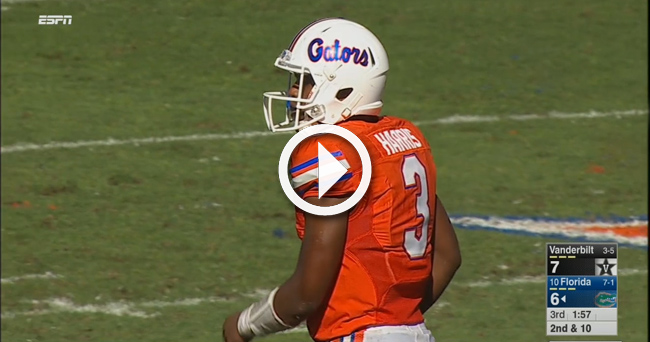
Film study: Can Florida win an SEC title with Treon Harris?
Let’s start with this: Florida already has overachieved.
Picked to finish fifth in its division, it won the East and reserved a spot in the Dec. 5 SEC Championship Game in Atlanta.
Now the question is: Can the Gators win it all with Treon Harris at quarterback?
Let’s start that conversation with this: The Gators almost beat LSU with Harris, but that game also hinted at possible problems because, even at his best, Harris still completed just 53 percent of his passes.
“I think Treon Harris has improved as a passer from last year, but he still isn’t going to beat anyone with his arm,” former South Carolina starting QB and SDS contributor Stephen Garcia said.
“Coach (Jim) McElwain’s offense is built for a passing quarterback. Harris’ strengths are his speed and mobility, not his passing and defense reading prowess.”
We spent time reviewing several games from Harris and other quarterbacks, including Will Grier, and what jumped out immediately is that Harris is very much a work-in-progress as a pocket passer.
Ultimately, that will hurt the Gators’ chances.
“He can make pretty much all the throws while on the run, but if you keep him contained in the pocket, you really shut down what he’s good at and what he is trying to do,” Garcia said
Does that automatically preclude a parade after the SEC championship game? Of course not, but Harris, while able to run, isn’t Tim Tebow, either.
A closer look at two areas in particular reveals where Harris needs to speed up his learning curve to give Florida its best chance in the SEC Championship Game.
The first is his ball-handling. We wrote earlier about how the SEC’s best QBs were masterful in their ability to manipulate defenses through crafty ball fakes.
Grier, a prototypical pocket passer and son of a former college quarterback, is particularly adept at selling play-action to create throwing lanes.
It’s been noted numerous times that Florida hasn’t drastically changed its offense since moving from the suspended Grier to Harris. That’s true. The Gators ran plenty of designed rollouts with Grier, too.
But you’ll notice a huge difference in the intent and execution.
On this play, Grier sells the run and rolls out already looking to throw. Running isn’t an option.
Harris, at times, appears indifferent to the impact play-action can have on a defense. Time and again, film reveals a lackadaisical arm extension, and sometimes, no extension at all. It’s as if Harris thinks the mere presence of a ball carrier is all he needs to sell the run.
SEC defenses have taken note.
Already wary of his ability and desire to run, linebackers and safeties often ignore the inferior play-fake and begin to play his potential roll-out.
We saw more evidence of sloppy ball-handling this Saturday in Florida’s uninspiring 9-7 victory over Vanderbilt.
On this particular play, a more enthusiastic fake to Kelvin Taylor might have given wideout Chris Thompson room to run by Vanderbilt’s corner. Instead, the Commodores recognized pass immediately and forced an incompletion.
Compare Harris’ fake to the “Glengarry, Glen Ross” sales job from Ole Miss QB Chad Kelly against Texas A&M. Kelly’s early arm action, showing defenders the ball, sold the run and swayed the Aggies out of position.
That allowed him ample time to roll back toward his left — into the direction of standout Myles Garrett, no less — set his feet and throw a touchdown strike to Laquon Treadwell.
The margins between winning and losing in the SEC are small enough that no detail is too small to correct.
Better ball-handling isn’t the only difference between Harris and Grier.
Harris is a natural runner with the ability to pass.
McElwain has designed plays to get Harris on the edge, where his dual-threat ability puts pressure on defenses.
The issue is when Harris turns designed pocket passes into improv.
Take a look at three very similar situations, one with Grier, another with LSU’s Brandon Harris and finally one with Treon Harris.
Each quarterback faces pressure, but Treon Harris’ reaction is different.
Grier and Brandon Harris stayed in the pocket and delivered touchdown passes knowing a big hit was coming.
Treon Harris missed an opportunity to make a play downfield because his running instinct kicked in.
It’s next to impossible to coach a first instinct out of a player, and Harris can make plays with his feet. The longterm problem is that’s an unsustainable — and unpredictable — mode of attack.
Quarterbacks like Treon Harris, who rely so heavily on their feet, certainly can win games.
Winning an SEC championship is an entirely different matter. Yes, Auburn’s Nick Marshall did it in 2013, but he did it behind a run game that accounted for 545 yards.
Harris and the Gators will have no such luxury, especially if their opponent is Alabama, which will force Harris to beat them with his arm.
“He has improved as a passer, but still has a long way to go,” Garcia said. “Last year he seemed to be guessing on almost every single snap, whereas this year he seems to have a little more sense of the offense.
“Only time will tell, but they need to put Harris in plays that use his athletic ability to get into space like Marshall did.”
